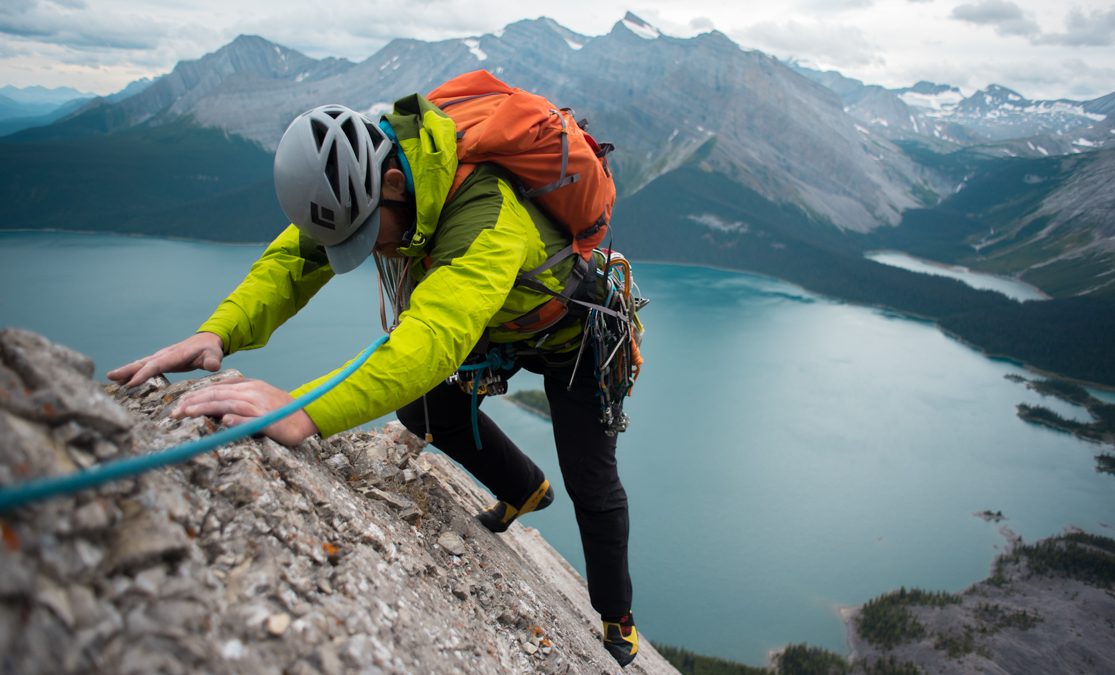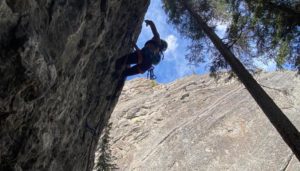How Climbing Guides are Adapting to the COVID-19 Pandemic
Guides are heading back to work with new health precautions and new methods of instruction
 Photo by: Anthony Walsh
Photo by: Anthony Walsh
As recreational rock climbers and professional guides return to climbing venues across the country, there is a new normal to reckon with. Should we hug our friends from the gym when we meet again? Untie their knot after they take a big whip off their project? Probably not. While the lucky few who can rope up with their partner in life — or who live with climbing roommates — may still share gear or rides to the crag; if our favourite partner lives across town or climbing with a guide makes us feel most confident on rock, Canadian climbers have new guidelines to consider while climbing during the COVID-19 pandemic. No group of climbers are more familiar with these best practices than Canadian climbing guides. Following instructions published by provincial public health agencies, guides are slowly reentering the workforce for the summer climbing season — and assessing the new terrain.
Legendary Canadian alpinist Barry Blanchard is just starting to get back to his job as a climbing guide with Yamnuska Mountain Adventures in Canmore. After a two and a half month hiatus, Blanchard said he is looking forward to taking his clients into the mountains again. While excited to get back to work, Blanchard, like the rest of Yamnuska’s 100 or so guides, is reading the outfitter’s 28-page document that outlines the ways in which one of Canada’s largest climbing guiding outfitters is getting back to business.
New Health Precautions
As you could imagine, forget the fist bumps after following the crux pitch cleanly — or sharing your last snack at the summit. Blanchard said hanging belays, popular multi pitches, and carpooling are all to be avoided, and, when not possible to keep a two-metre distance, guides are instructed to use face masks and gloves. Transitions at belay stations will also feel clunkier than normal; the gear exchange from follower to leader will now have a hand sanitizing ritual before and after.
While each guiding outfitter is free to adopt their own regulations for rock guiding during the pandemic, the ACMG has worked with several outfitters including Yamnuska to develop back-to-work guidelines. Before heading out with their guide, clients will sign a declaration of health — adding an initial each day of their program to show there have been no changes. At the end of each day any textiles such as slings, ropes, and harnesses will be scrubbed with soap and water followed by a 24-hour period prior to being reused. Hard goods like carabiners and belay devices are dipped into a disinfectant solution. When asked how guides are managing the new cleaning guidelines, Blanchard said, “Even the guides who are used to working 15 days in a row are probably just doing weekends now. They’ve got lots of time.”
Financial Projections
Peter Tucker, the executive director of the ACMG, said it has taken a principles-based approach to working during a pandemic. By talking to ACMG members about the principles of viral transmission, guides are equipped to handle situations that are not explicitly described in a back-to-work document. “As climbers, we know anything can happen out there. If we’re aware of what viral transmissions are, we can make a decision in those grey and undescribed situations,” Tucker said.
Though guides are thankful to be back at work, many are aware that this summer may not be a financial highpoint for their business. Travel restrictions and physical distancing don’t exactly bode well for climbers looking to save money by booking in larger groups. “It’s a balance between getting back to work and staying healthy,” said Dave Stark, Yamnuska’s director of operations. Stark said Yamnuska’s initial post-lockdown projections expected to see only 25 per cent of Yamnuska’s normal traffic this summer. Aspirant guides will have to wait until the summer of 2021 to be hired by the outfitter — Stark said its core set of guides will be receiving any available work during the pandemic.
Peter Tucker said the ACMG has seen the direct financial impacts on Canadian guides. Estimates of guides’ summer revenue before and after the COVID-19 businesses closures illustrate an expected 30 to 100 per cent drop in revenue.
Alternative Methods of Instruction
While climbers who have lost wages during the pandemic may not have the pocket book to hire a private guide this summer, there are several options for those eager to gain professional instruction. Online guiding courses have become increasingly popular as an efficient way to reduce the cost of instructional guiding courses while gaining important knowledge from home. Outfitters like the Squamish-based Altus Mountain Guides had begun filming online versions of their classroom-based courses last year, but have since worked hard to create digital versions of all their outdoor courses.
Ross Berg, the founder of Altus Mountain Guides, said he believes the proliferation of online guiding courses was bound to happen as they provide a flexible and cost-effective option for climbers throughout Canada. “Online courses are something I’ve wanted to do forever,” said Berg. “So much of our work [at Altus Mountain Guides] is instructional, and people come in at so many different abilities, so it can be difficult to maximize [the client’s] time.” Berg has worked to develop an online-offline hybrid course where after the client completes a digital component, the guide will take them climbing outside in a one-on-one setting. Berg said the hybrid course’s promotion of physical distancing and tailored instruction has been a big hit with clients so far.
Online courses may well become the industry standard, even after larger classroom gatherings receive the go-ahead. Berg said his online renditions have appealed to climbers not living in mountain hotspots, as courses which require a minimum number of participants often only fill up on weekends. Guiding courses that can be completed on the couch allow his clients to learn at their leisure — and show up to the mountains ready to climb. “[When clients learn technical information online] it cuts an hour of instruction off the morning and we have a better chance of summiting,” Berg said.
Popular climbing festivals like the Arc’teryx Climbing Academy in Squamish are also testing digital venues this summer. While the attending climbers won’t be able to sample its famous splitter granite this August, the festival promises to deliver inspiring speakers, films, and professional clinics. Even the guides who train guides are looking at online opportunities. Peter Tucker said the ACMG is looking to introduce video modules as part of its guiding mentorship process.
Whether guides are placing another piece to protect their client following a traverse, or scrubbing their carabiners in disinfectant at the end of each day, Tucker understands that preventing the spread of this virus is a critical element of being a responsible guide. “Protecting the public is our primary mandate,” Tucker said.


